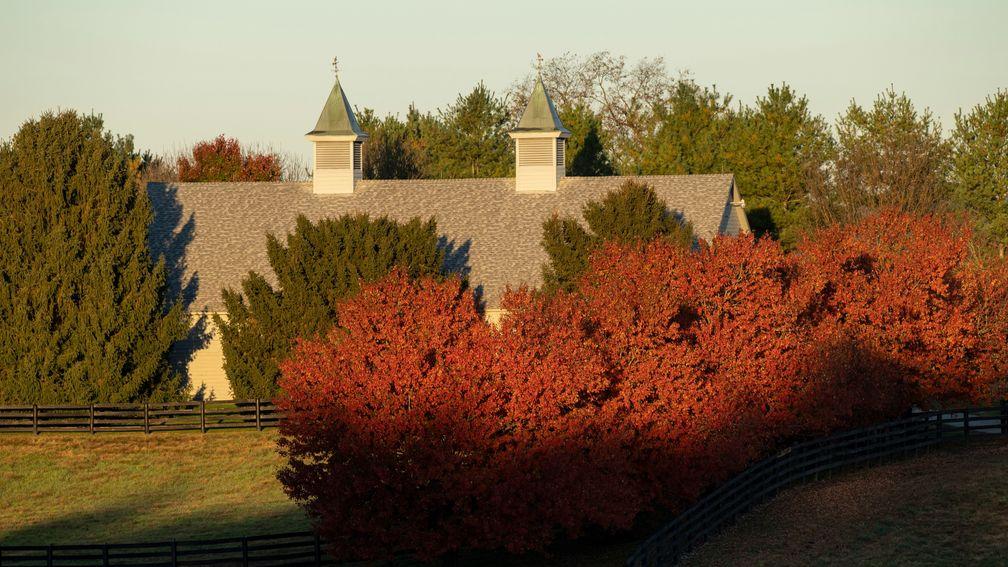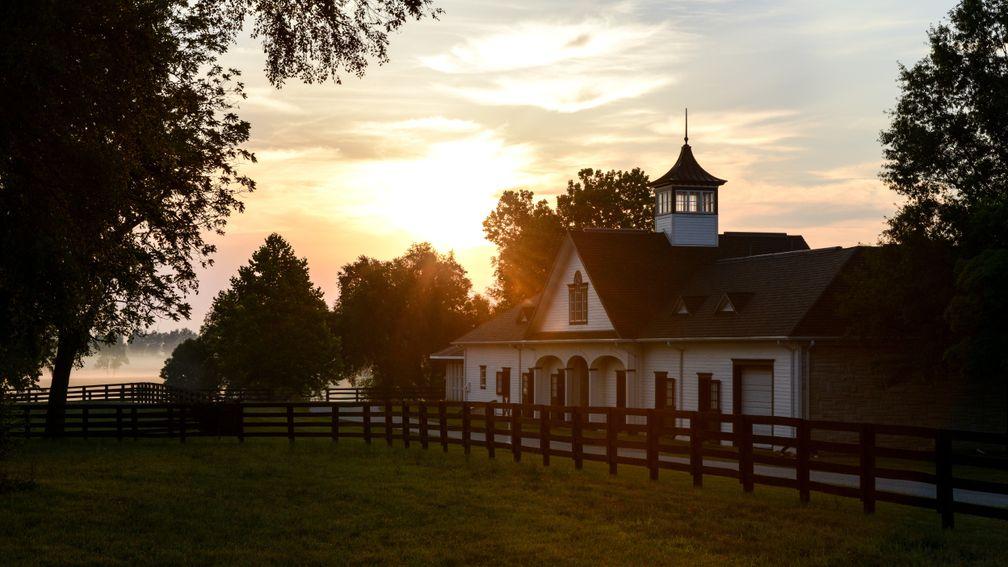'The best outcome' - Breeders react to Jockey Club mare cap rule rescission
Among those in support are Ashford Stud, Spendthrift and Three Chimneys

Action this week by the Kentucky General Assembly to prohibit a rule by the Jockey Club limiting the number of mares bred to a stallion in a given year coupled with an on-going lawsuit brought by three major stallion farms prompted a rescission of the rule.
The American Stud Book rule, adopted in May 2020, restricted the number of mares bred to 140 per stallion in a calendar year and was created to address a declining and concerning degree of diversity within the thoroughbred gene pool. Enforcement of the rule was to begin with stallions born in 2020 and later, while active stallions bred prior to 2020 had no restrictions.
Even with a transition phase, the rule sharply divided the Thoroughbred breeding community.
"The Jockey Club board of stewards is rescinding this rule as it is concerned that the reaction to the rule may divide the industry at a time when there are many important issues that need to be addressed with unity," said Stuart S. Janney III, chairman of the Jockey Club. "We are taking this action for the greater good of the entire industry.
"The Jockey Club remains committed to the sustainability and welfare of the breed and will continue to invest in programs and research that will bolster and support the industry in the years to come."
Kentucky legislators entered the fight through HB 496, a bill that prohibited a registrar of thoroughbreds to restrict the number of mares bred to a stallion or refuse to register any foals predicated on the number of mares bred. The bill also struck from KRS Chapter 230 language that required all Thoroughbreds born in Kentucky to be registered with The Jockey Club and tasked the Kentucky Horse Racing Commission to "select and utilize an entity to serve as the registrar of thoroughbreds" that "shall submit to the jurisdiction of Kentucky and shall comply with the laws of this chapter."
In 2021, Kentucky accounted for 16,727 mares bred in North America, which is just over 60 per cent of all mares bred in the United States, Canada, and Puerto Rico.
HB 496 was sponsored by Speaker of the House Rep. David Osborne (R-Prospect) and Rep. Matthew Koch (R-Paris) and had the support of Sen. Damon Thayer (R-Georgetown).
"I told the Speaker if it passes through the House, I would try to get it passed through the Senate," Thayer said. "I feel like my fellow Republicans would agree the cap is an artificial restriction on commerce and free enterprise. I'm sure we could have passed this.
"I have a lot of friends in the horse business, and I participate in a lot of racehorse partnerships," Thayer continued. "I have talked with friends on both sides of this issue, and I respect the arguments on both sides, but I support the Speaker's bill as a free market capitalist."
The Jockey Club's decision to shelve the rule relieved many who predicted long-term economic damage to the commercial market if the rule stayed in place.
"When we breed a mare it is a choice, not a need. If the only option to breed a mare is a stallion that we do not feel reasonably positive will be successful, then we simply will not breed the mare," said Martha Jane Mulholland, who operates Mulholland Springs with her son, John. "And if people lose money breeding a mare, they are not going to be ready to do it again. Mares will be taken out of production and their genes will vanish. We were already starting to see the economic impact on the value of horses; it was here.
"This is the best possible outcome," Mulholland said about the rule being pulled. "The Jockey Club will continue to register the horses and this will be wonderful for the small breeder and the long-term health of the breed."
Carrie Brogden, who runs Machmer Hall with her husband, Craig, supported the rule because it created a vehicle to drive more support to second- and third-year stallions and increase their opportunity to succeed.
"Some people say mares would not be bred, but no one pays board bills, pays for hay, pays for grain, pays for palpations, and doesn't breed their mare," Brogden said. "What has changed is the phenomenon with all the first-year stallions sucking up so many mares in their books and no one's there for the second year to help develop these stallions. Some first-year stallions may hit, but then there is nothing coming up behind and the horses die on the vine or get sold."
With the rule now gone, Brogden said she feels the stallion cap generated the same unwarranted fear as earlier efforts to ban race-day furosemide.
"People were so afraid and then we ran the two-year-olds and Graded stakes horses without Lasix and all of sudden, nothing happened. With the cap, it would have gone back to the way it was when I moved to Kentucky in 2001. Mares got bumped off the books all the time," she said. "So now [with the rule rescinded] nothing changes with how we operate. We have mares to foal and mares to breed, but it was a good idea. I do feel a lot more strongly about the drug issues and having the industry focus on that is more important than the cap."
Eliminating the rule also means the goal of a lawsuit filed last February by Spendthrift Farm, Ashford Stud (under the name Bemak N.V.), and Three Chimneys Farm is now moot. The farms challenged the rule for being "arbitrary" and "anti-competitive." Their complaint argued, too, the rule would drive overseas the best stallion prospects in North America.

"First and foremost, we are respectful of all parties on both sides of the mare cap issue," said Eric Gustavson, the owner of Spendthrift. "We appreciate the Kentucky legislature saw things as we see it, and we are pleased with the Jockey's Club's decision to rescind the rule.
"We welcome the Jockey's Club's call for unity moving forward to help make this a better industry for everyone involved," he continued. "Lastly we are thankful for all the support we have received, and we are happy to be moving on."
Gonçalo Torrealba, the chairman of Three Chimneys, also said he appreciated the Jockey Club's decision in the name of industry unity.
"Three Chimneys applauds the Jockey Club's decision with regard to the proposed mare cap rule. We agree that unity and collaboration within our industry is the path towards a sustainable and successful future for all participants at every level," Torrealba said.
Ashford Stud also issued a statement that praised the efforts of Osborne and Koch.
"The Jockey Club has listened to concerns expressed, and we endorse its call for the industry to unite behind the common goal of growing and promoting Thoroughbred breeding and racing in Kentucky and throughout the USA. We should work together to ensure the sustainability and welfare of the breed and invest in supporting the industry's future," Ashford said in its statement.
"It is clear this legislation had overwhelming support from state legislators, who recognised that the cap risked impacting the livelihoods of many working in the industry and would have hurt an activity for which Kentucky is internationally renowned and respected.
"We commend Speaker Osborne and Representative Koch for taking the lead on this issue, which will help to keep Kentucky relevant in the international bloodstock market. From our experience in Ireland, we know how important it is to nurture a critical mass of breeding excellence, which is a position Kentucky has long held, and can now maintain into the future.
"It could not have been in the interests of Kentucky racing for the progeny of great sires like Spendthrift's Into Mischief, or Three Chimneys' Gun Runner to be restricted artificially. The quality and attraction of an auction house like Keeneland would have been damaged if, for example, the cap had reduced the number of yearlings from a stallion of the calibre of Into Mischief each year at Kentucky sales by over 70.
"We praise the International Stud Book Committee for the work they continue to do to create harmonised global breeding rules. We also want to thank the many scientists and genetic experts whose insights informed our view that the cap would not have contributed in any meaningful way to promoting genetic diversity."
Get up to date with all the North American bloodstock and racing news at Bloodhorse
Published on inNews
Last updated
- Royal Ascot winner Arizona on the move as Coolmore sire joins the exodus to Turkey
- Something different for Burrows as Group 1-winning trainer consigns at the Tattersalls Cheltenham December Sale
- Breeding right to Blue Point sells for €430,000 on Darley winning bid platform
- Classic hero Metropolitan set for strong home support with Etreham busy at the sales
- 'It has been nothing short of incredible' - Grace Hamilton on Godolphin Flying Start experience
- Royal Ascot winner Arizona on the move as Coolmore sire joins the exodus to Turkey
- Something different for Burrows as Group 1-winning trainer consigns at the Tattersalls Cheltenham December Sale
- Breeding right to Blue Point sells for €430,000 on Darley winning bid platform
- Classic hero Metropolitan set for strong home support with Etreham busy at the sales
- 'It has been nothing short of incredible' - Grace Hamilton on Godolphin Flying Start experience